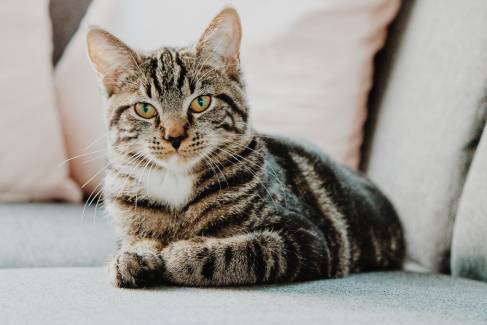As a pet parent, caring for your cat’s health is a full-time job. When cats are younger, they may not face many serious health issues; however, accidents can happen. But as they age, cats (like us) are more prone to more serious health problems. The health issues in older cats can be more expensive, too, when it’s time for veterinary treatment. For this reason, many pet parents are interested in buying pet health insurance for their senior cats.
Connect with a verified veterinarian in minutes. Licensed vets are available 24/7 to answer your questions. No need to worry about your furry family member.
If you’re the pet parent of an older cat and are interested in buying pet health insurance, then you’ve come to the right place. In this article, we’ll take a look at some important points to consider about senior pet health insurance and then review some of the top health insurance policies for senior cats. Let’s get started!
At What Age Does a Cat Become a Senior?
There is some debate over when a cat is considered a senior. However, most vets and pet health insurance providers consider a cat between the age of 7 & 8 years to be a senior.
Many pet health insurance policies, at this age, increase their premiums. Another important note is that while the policy may stay in effect, the cutoff age for many policies is 14 years of age for accidents and illnesses. After this, the pet policy will no longer payout.
Keep in mind that this information is general. Each policy will vary and have its own age limitations and more. What’s more, the older your cat, the higher the premium and add-ons may be.
What Types of Insurance are Available for Senior Cats?
Not many pet parents realize that there are several types of insurance available for their senior cats. These include:
- Guaranteed life: this coverage protects against accidents and illnesses throughout your cat’s life; however, you’ll need to start the policy before the age limit. This isn’t actually a policy by itself; instead, this is a guarantee that’s added to an insurance policy.
- Medical discount plan: this coverage offers discounts for regular and emergency vet services. They repay at a flat rate, which includes treatment for pre-existing conditions. This isn’t a true insurance policy, but senior cats are usually accepted. Keep in mind this policy may limit you to in-network vets in order to get the discounted services.
- Accident-only: this is a basic type of policy that covers accidents such as eating a foreign object, broken bones, and more. These policies may come with an annual payout limit, which means for anything over that limit, you’ll need to pay out of pocket. This is a policy that accepts senior pets, even without prior insurance coverage.

Review symptoms, medications & behavior to keep your pets healthy with a Vet Online in just minutes.
Ask a Vet Live NowAre Add-ons Important?
Add-ons are a way to provide even more protection than the basic policy provides. When reviewing add-ons, be sure to check the prices charged for each one. Some charge more for senior pets. If that’s the case, you may be better off setting the money aside in a savings account for veterinary bills.
Here are some of the most common add-ons available:
- Boarding: covers boarding kennel if your fur baby requires hospital care for several days.
- Routine care: pays for annual exams, vaccines, and other pet wellness services.
- Vacation cancellation: covers expenses such as cancellation fees for nonrefundable airfare if your pet needs emergency care.
- Burial: pays for burial expenses if your pet dies or needs to be put to sleep.
The Best Pet Insurance Policies for Senior Cats
OK, now we’re ready to review some of the best health insurance policies for senior cats!
1). Petplan
PetPlan is one of the insurance providers we found to offer the most affordable rates combined with a range of coverage for all types of conditions. Plus, they don’t have age limits for older cats.
Here’s what they offer/cover:
- No age or annual limits
- Affordable rates
- Includes illnesses and accidents
- Covers curable pre-existing conditions
- Diagnostic tests
- Vet exam fees
- Imaging & ultrasound
- Cancer treatments
- Non-routine dental treatments
- Surgery & rehabilitation
- Holistic therapies
- Referral & specialist treatment
Not covered by this policy:
- Routine & wellness care
- Preventive care
- Pre-existing conditions (check policy for specifics)
- Cosmetic procedures
- Liability coverage
2). Pet Assure
Pet Assure isn’t a standard pet health insurance policy. Instead, it’s one that offers discounts for vet bills at their in-network (participating) veterinarian clinics. This may be a problem if you live in an area where they don’t have in-network vets. However, the network includes over 5,000 vets around the country.
There are no annual coverage limits, deductibles, or waiting periods. And there’s no age limit. The plan covers accidents, illnesses, and preventive care, as well as pre-existing conditions.
One thing to keep in mind is that the rates are low to cover a senior cat (about $10/month paid monthly, or $6.58 paid annually). The plan reimburses about 25% of the veterinary costs, which is quite a bit lower than standard insurance plans. However, when the monthly rates are this low, you could set aside the difference between this plan’s cost and the cost of standard pet insurance. Put this in a savings account and let it grow. Then if there’s a large medical expense for your cat, there will be funds available to help with the costs.
This plan offers/covers:
- Low monthly fees
- Coverall types of pets (even llamas!)
- No annual limits or deductibles
- No waiting periods
- Pays for pre-existing conditions
Cons/Not Covered:
- Prescriptions are not covered
- Limited to in-network veterinarians
- Covers only 25% of veterinarian costs
3). ASPCA Pet Health Insurance
The ASPCA (American Society for the Prevention of Cruelty to Animals) offers pet insurance. One of the benefits of this policy is that there is no network. You can visit any vet in the US or Canada.
Another nice thing about this policy is that it offers a 10% discount if you’re the pet parent of multiple cats.
Their Complete Plan covers illnesses, accidents, and more. The premiums, even for senior cats, are affordable. We did a quick quote with them for an 8-yeard old cat. The quote was about $22.45 a month for complete coverage. You can choose from different annual limits, including: $3,000, $5,000, $7,000, and $10,000. And you can choose the reimbursement rate, too: 70%, 80%, 90%. You also have the choice of an annual deductible: $500, $250, or $100.
Here’s what’s covered:
- Accidents
- Dental disease
- Behavioral issues
- Illnesses
- Hereditary conditions
- And more
What’s not covered:
- Pre-existing conditions
- Breeding costs
- Cosmetic procedures
- Preventive care
Before choosing a pet health insurance plan for your senior cat, be sure to read through the entire policy before signing on the dotted line. If you have any questions about the products, it’s a good idea to contact the insurance providers directly. You may also want to ask your vet if they can go over the policy with you.
It’s well worth the cost to ensure your senior cat. Just be sure to read each policy and understand what’s covered and not, as well as the cost of the insurance.
Connect with a verified veterinarian in minutes. Licensed vets are available 24/7 to answer your questions. No need to worry about your furry family member.

Julie
Julie is a graduate of the University of North Carolina, Wilmington, where she studied Animal science. Though contrary to the opinion of her parents she was meant to study pharmacy, but she was in love with animals especially cats. Julie currently works in an animal research institute (NGO) in California and loves spending quality time with her little cat. She has the passion for making research about animals, how they survive, their way of life among others and publishes it. Julie is also happily married with two kids.
Review symptoms, medications & behavior to keep your pets healthy with a Vet Online in just minutes.
Ask a Vet Live Now



